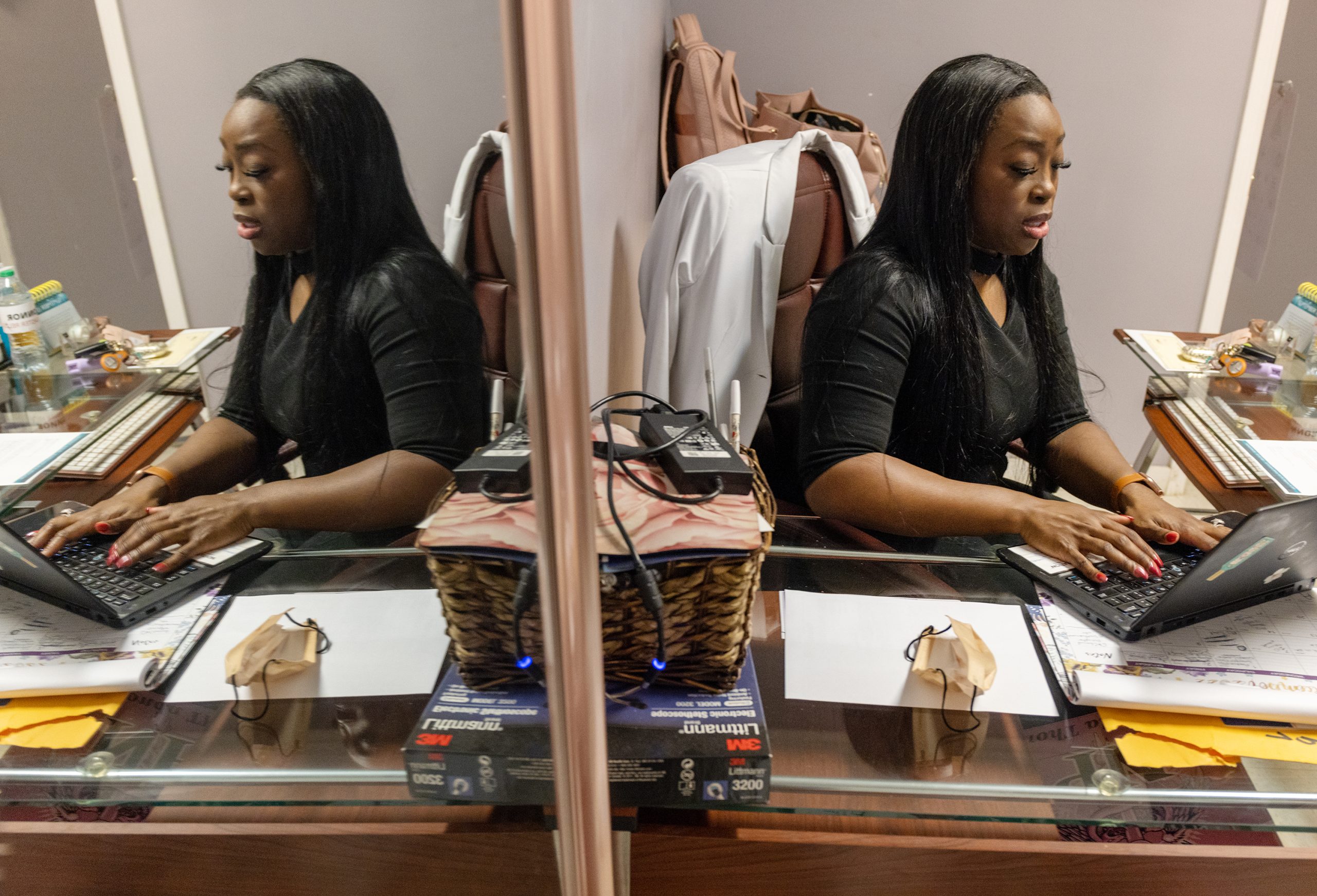Mississippi Today
As health infrastructure shrinks, a daughter of the Delta cares for her community
As health infrastructure shrinks, a daughter of the Delta cares for her community
To reach Gunnison, Mississippi, from Cleveland, the quickest path – though not the route with the best-paved streets – takes you off Highway 8, down miles of narrow roads slicing through some of the most fertile land on earth. In early December, the fields are still but not empty. Silvery water pools in gashes in the dirt, and cardinals settle on shoots of electric green gleaming in the gray light of winter.
When you reach Highway 1, you’ve arrived in Gunnison, with a population of 425 and only two businesses: a gas station and Healthy Living Family Medical Clinic, opened by Gunnison native Wyconda Thomas in 2019. The squat brick building is decorated for the season, with a wreath on the door and letters out front spelling “Merry Christmas.”
When Thomas decided to open her own practice, she chose the place where she saw the greatest need, which also happened to be the community that raised her.
Despite the town’s small population, the clinic is full every day.
“The statistics– it pointed to these areas,” Thomas said. “The Delta, the lack of resources– if you look at who suffers the most, it’s always these areas. That’s the place you should be treating.”
No region of the state has been harder hit by the decimation of Mississippi’s health infrastructure than the Delta. Kings Daughters Hospital in Greenville closed in 2005, and Patient’s Choice Medical Center in Belzoni followed in 2013. Now, Greenwood-Leflore Hospital is scrambling to find funding to stay open through the legislative session, when it hopes to persuade lawmakers to help.
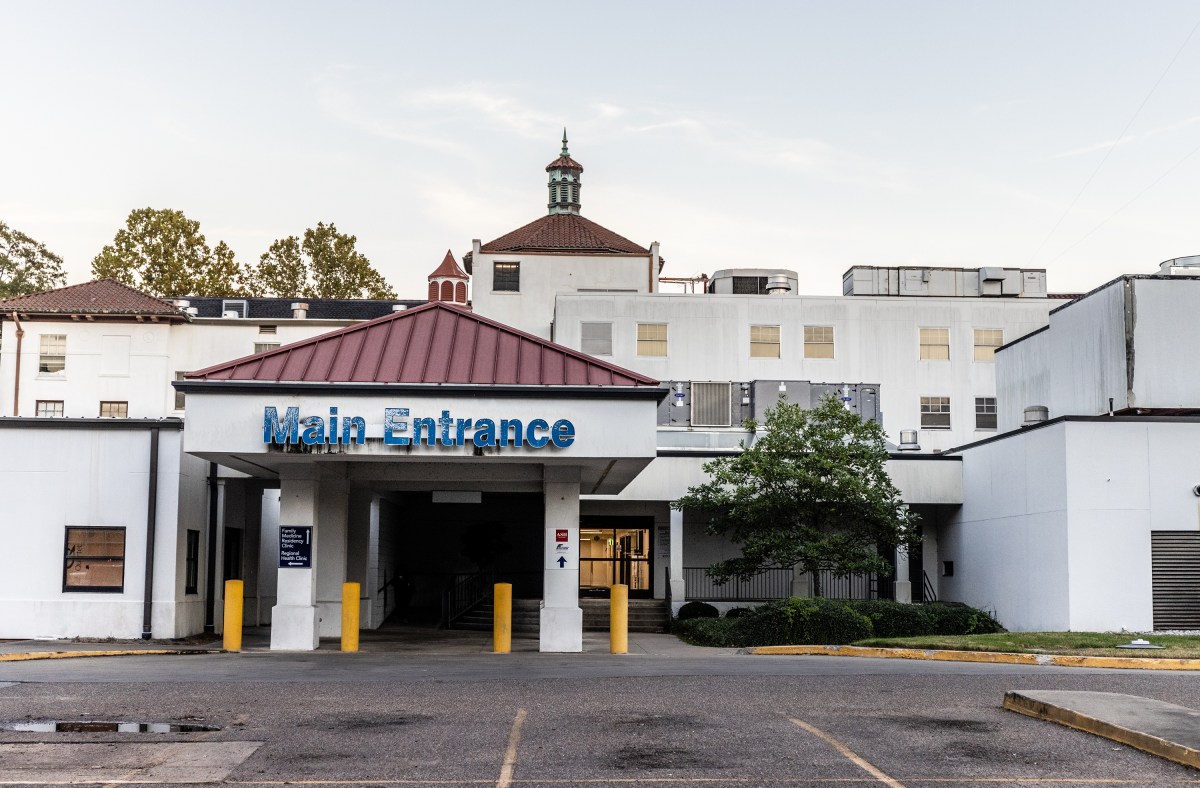
Even if the money comes through, there is no long-term plan to ensure Delta residents have access to health care. The predominantly Black region is one of the poorest in the country, and like the state as a whole, it has high rates of diabetes, hypertension and heart disease.Earlier this year, state health officer Dr. Daniel Edney said the region’s health infrastructure is “very fragile” and six Delta hospitals are at risk of closure.
“No one’s coming to the rescue,” he said.
No one, that is, except for Thomas and people like her: Delta natives who have chosen to open their own small clinics close to home. People like Mary Williams, who runs Urgent and Primary Care of Clarksdale; Juliet Thomas, Antoinette Roby and Desiree Norwood of the mobile clinic Plan A; and Nora Gough-Davis, who operates clinics in Shaw and Drew.
They face policies that seem almost designed to punish them for trying. Nurse practitioners are reimbursed by Medicaid just 85% of what physicians receive for providing the same services. State regulations require them to have a collaborating physician, to whom they must pay a monthly fee that can reach over $1,000. The state’s failure to expand Medicaid means more of their patients lack insurance, and they may never see a penny for treating them.
“You have to give yourself,” said Gough-Davis, who trained Thomas and 25 other Delta nurse practitioners at her clinics. “It’s really like community service. We have patients with low, low health literacy. So our typical visit is going to require much more education than a visit with someone who doesn’t have health literacy issues. Education takes time.”
And payment structures don’t account for that time.
“It never comes close” to full compensation, Gough-Davis said of the typical reimbursement.
Owning her own practice, Thomas has had to learn how to handle paperwork and billing and dealing with reimbursement from Medicaid and insurance companies. She works from 8 a.m. to 6 p.m. most days, and spends weekends and evenings attending trainings and seminars. She sees everything from the flu and COVID-19 to anxiety and depression to birth control requests.
WIth the health department presence in Bolivar County shrinking and hospitals closing, clinics like Healthy Living are under pressure.
“The struggles are there,” she said. “Everything is being put onto family practice now.”
And yet Thomas struggles to imagine working anywhere else.
“The people here get me and I get them,” she said. “It’s rewarding to make a difference and to do this. I feel like I have God’s favor because of that.”
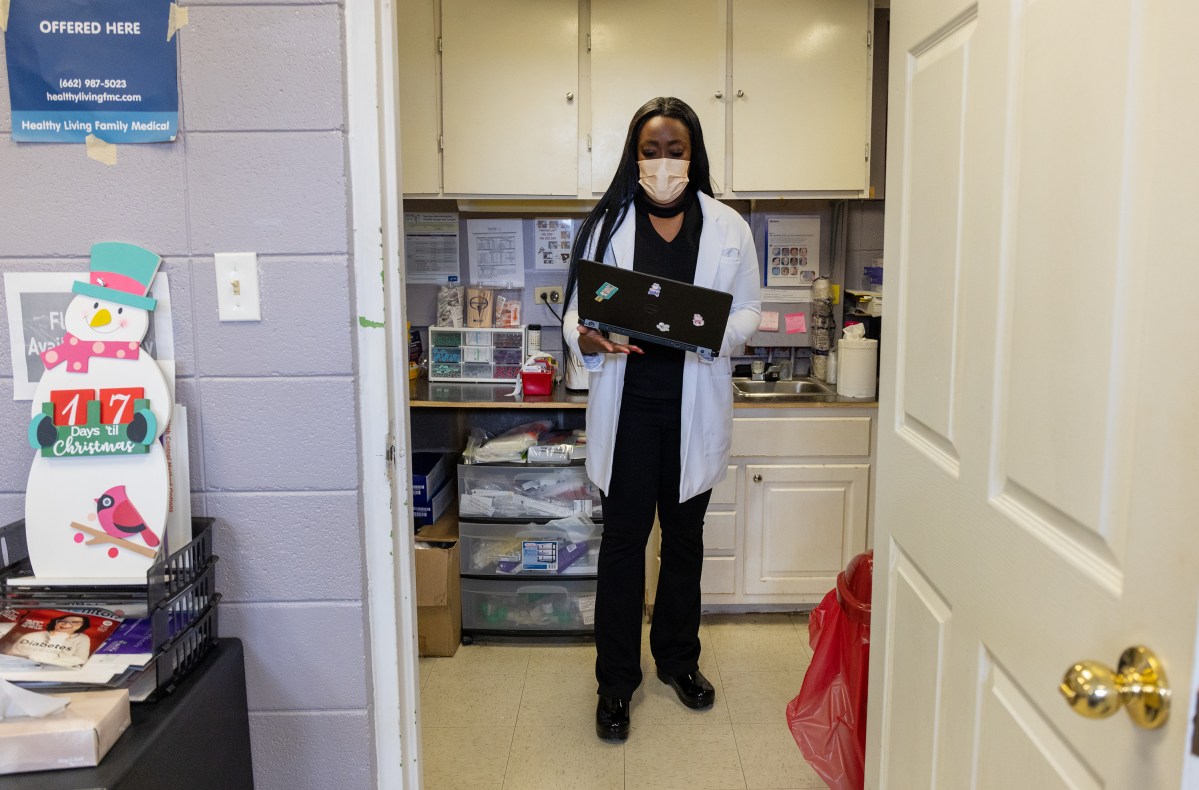
‘A personal connection to her patients’
Just before 9 a.m. on a recent Thursday, Thomas prepared to see her first patient of the day: a 3-year-old boy at the clinic for a well-child exam.
She wore black scrubs, with a matching scarf and shiny shoes, and a tidy red manicure. The clinic’s rooms radiated the same warmth and cheerful competence that she did: In the lobby, posters advertise free sports physicals and family planning services. A Christmas tree was decorated with hot pink ornaments.
Clutching a clipboard, Thomas walked into the first exam room to see her patient, accompanied by his mom and grandfather.
“Come on, hop up here,” she said to him, gesturing to the table. “I think he might need some help.”
She lifted him up and he sat calmly on the table, his hands folded in his lap and his sneaker-clad feet dangling several feet off the floor.
Thomas told his family that he needed to be in a booster seat and wearing a helmet when riding a bike. She confirmed he had recently seen a dentist, and would need a vision screen today.
“How’s his diet?” Thomas asked. “Does he eat a lot of foods like rice, cereal, cheeseburgers?”
“That’s about the only thing he’ll eat,” his mom answered.
Thomas laughed. She checked the boy’s ears. He gazed calmly around the room, never fidgeting or whining.
“You such a good little patient!” she exclaimed.
She told his family that he had some fluid in his ears, so she would send a prescription over to their pharmacy.
Then her time with the boy was over. The visit hadn’t been complicated, but Thomas had been able to confirm the 3-year-old was healthy and growing well, and his vision was good – a particularly important finding as he approached kindergarten, which most Mississippi kids reach without ever having had a developmental screening.
A few hours later, a 57-year-old woman named Arlesia Mobley sat in a different exam room. She complained of a headache and dizziness.
“Been around anybody sick?” Thomas asked.
“My grandbaby,” Mobley said. “She had the flu.”
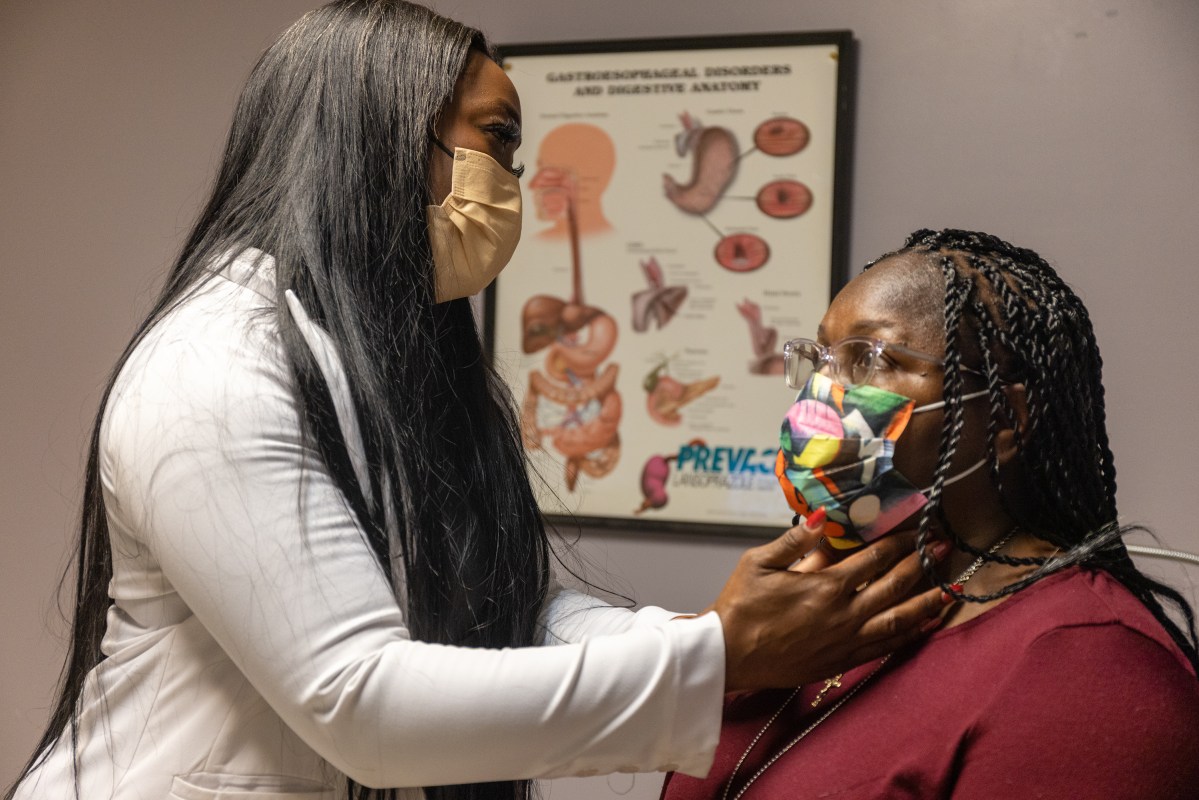
Thomas checked her ears and saw fluid, which she explained was probably causing Mobley’s dizziness. She asked a nurse to conduct a flu swab but went ahead and ordered Tamiflu for her patient. She advised her to drink plenty of fluids, eat chicken noodle soup, and rest as much as possible.
A few days later, Mobley said she was feeling better, but still drained.
She had had to find a new doctor earlier this year because of her insurance. She lives in Rosedale, so Thomas was close by. She already feels like Thomas knows her.
“When she step into the room, she’s got that smile,” Mobley said later. “When she pass by you and you (are) sitting out in the waiting room, she got that smile. That makes me feel good, ‘cause I mean most doctors… especially in the waiting room, their mind wouldn’t be on you nowhere. But it seem like she got a personal connection to her patients.”
Opening a clinic in her hometown
Thomas is a daughter of the Delta, raised in Gunnison and Rosedale. Her parents both coached basketball, and she grew up in the gym. She was a star player at West Bolivar High School and then played for Delta State.
Her mom and dad, both Bolivar County natives, too, had high expectations for their daughter.
“When she was growing up, she couldn’t bring no C’s into my house,” said her mother, Will Ethel Hall. “I don’t want nothing but A’s, but we’ll talk about a B, because you was playing sports and maybe you didn’t get it that way. No C’s were allowed, and she knew that.”
“I was real hard on her,” said her father, Willie Thomas, who coached her at West Bolivar.
A few weeks ago, he ran into a woman in the store who was remembering how he had pushed his daughter. Thomas told her that looking back, he felt it had been too much, and he would do things differently if he could.
“She said, ‘Look how she turned out,’” Thomas said. “I said, ‘You right. I’d do it the same.’”
After college, she spent a year teaching biology before deciding she wanted to go into nursing and going back to school. She knew she’d like to open her own practice eventually, so she made a point of working in as many areas as she could – postpartum care, pediatrics, nursery, neonatal intensive care unit, home health and intensive care.
“You own your own practice in the Delta, you gotta be everything – resources are very, very limited, you know,” she said.
The Greenville NICU where Thomas trained closed earlier this year, leaving the Delta with no NICUs at all.
As soon as Thomas became a nurse practitioner in 2015, she started working on plans to open her own clinic. Her grandfather had owned the little building in Gunnison that had once been a county health facility, and the family left it to her for her business.
When she approached Gunnison leaders about opening a clinic there, they were elated.
“Our area is really underprivileged, and we just needed a clinic here in town to help our citizens,” said Mayor Frances Ward, who has known Thomas since she was born. “A lot of them don’t have transportation, and they had to pay people to carry them to Cleveland to the doctor. It’s really a blessing that she is here. And we’re very proud of her being from Gunnison, to come back and help her fellow people.”
Thomas opened Healthy Living on Jan. 2, 2019.
Gunnison residents like 70-year-old Ruby Hall, who works for Thomas as a nurse at the school-based clinics she runs in Rosedale, can’t recall a doctor or nurse coming back to the town in the last 60 years.
Tina Highsmith, executive director of the Mississippi Association of Nurse Practitioners, said that’s a common trajectory for Mississippians in their field.
“Even though I had moved to several other parts of the state, when I came back to open a clinic it was in my hometown,” she said. “Those NPs have already established relationships… And so the patients know them, they trust them.”
And Thomas knows her patients, often personally as well as through her work. That’s part of what drives her.
Her mother remembers missed lunch appointments because the clinic was so busy, and detours during drives to check up on patients at their homes or drop off medicine.
“It’s just a tie that I have here,” Thomas said. “They need me so bad. At least I feel like they do. That makes me stay here.
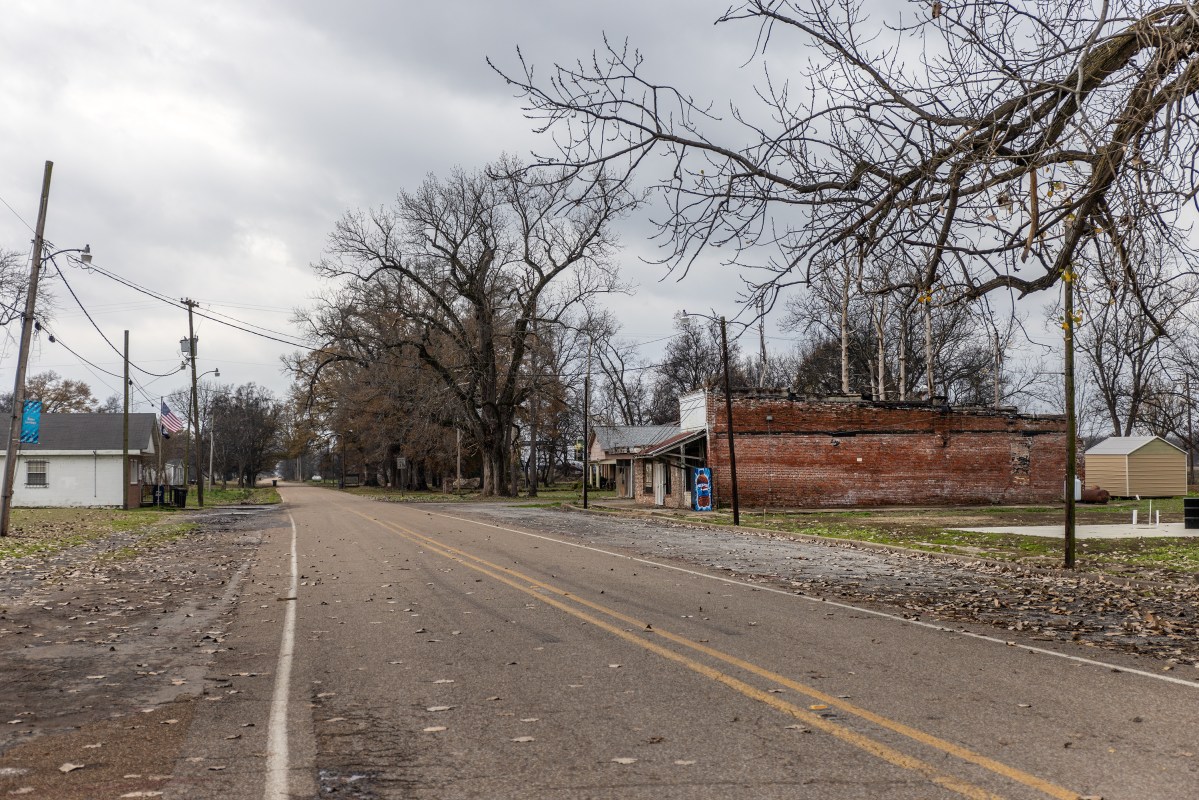
From 13 county health department clinics to one
At the only other business in Gunnison, Bassie’s Service Station, Charlette Brady slices cold cuts, makes sandwiches and rings up bottles of soda and beer.
“Really don’t much go on here,” she said.
The opening of Thomas’s clinic was a rare event. Before, Brady and her children traveled to Cleveland for doctors’ appointments. Now, the whole family goes to Healthy Living.
Inside the lobby of the clinic, a plaque commemorates the building’s history. Preserved in the cinderblock wall, the black sign with silver lettering reads: “Bolivar County Branch Health Center. Gunnison, Mississippi. 1960.”
The plaque also hints at how rural Mississippi’s health care resources have shrunk over the last several decades, because the Gunnison county health department site closed sometime in the 1980s. Before Thomas opened her clinic in 2019, it served as a polling location and a small restaurant before sitting vacant for years.
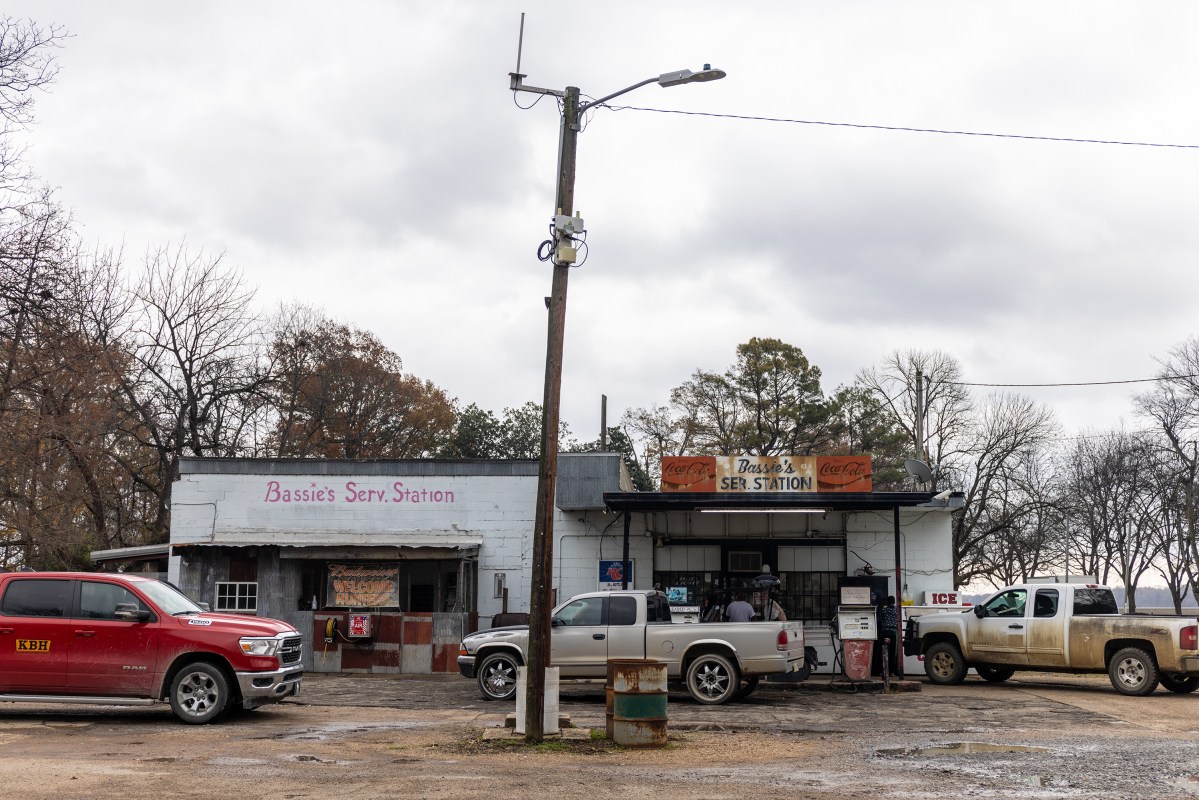
In 1975, Bolivar County boasted 13 satellite clinics in addition to the main county health facility in Cleveland.
“We try, especially in the Cleveland office, to offer general health services every day of the week,” county health officer Dr. Dominic Tumminello, a Gunnison native, told the Clarion-Ledger that year. “When a person walks into our health clinic, we want to serve that person.”
The county health department building in Rosedale, a 10-minute drive away, closed in February 2016, along with eight other such facilities around the state. Today, there is only one county health department site in Bolivar, in Cleveland, and it is open only four days a week, with limited walk-ins and family planning services requiring a call ahead of time.
Rosedale’s pharmacy closed recently, too, when its owner retired.
The nearest hospital is 30 minutes away, in Cleveland.
The Delta’s population is declining and has declined dramatically since 1940– part of the reason why large hospitals built early in the 20th century are struggling.
In Bolivar County, 29% of adults lack health insurance. Thirty-six percent of county residents live in poverty, compared to 20% statewide.
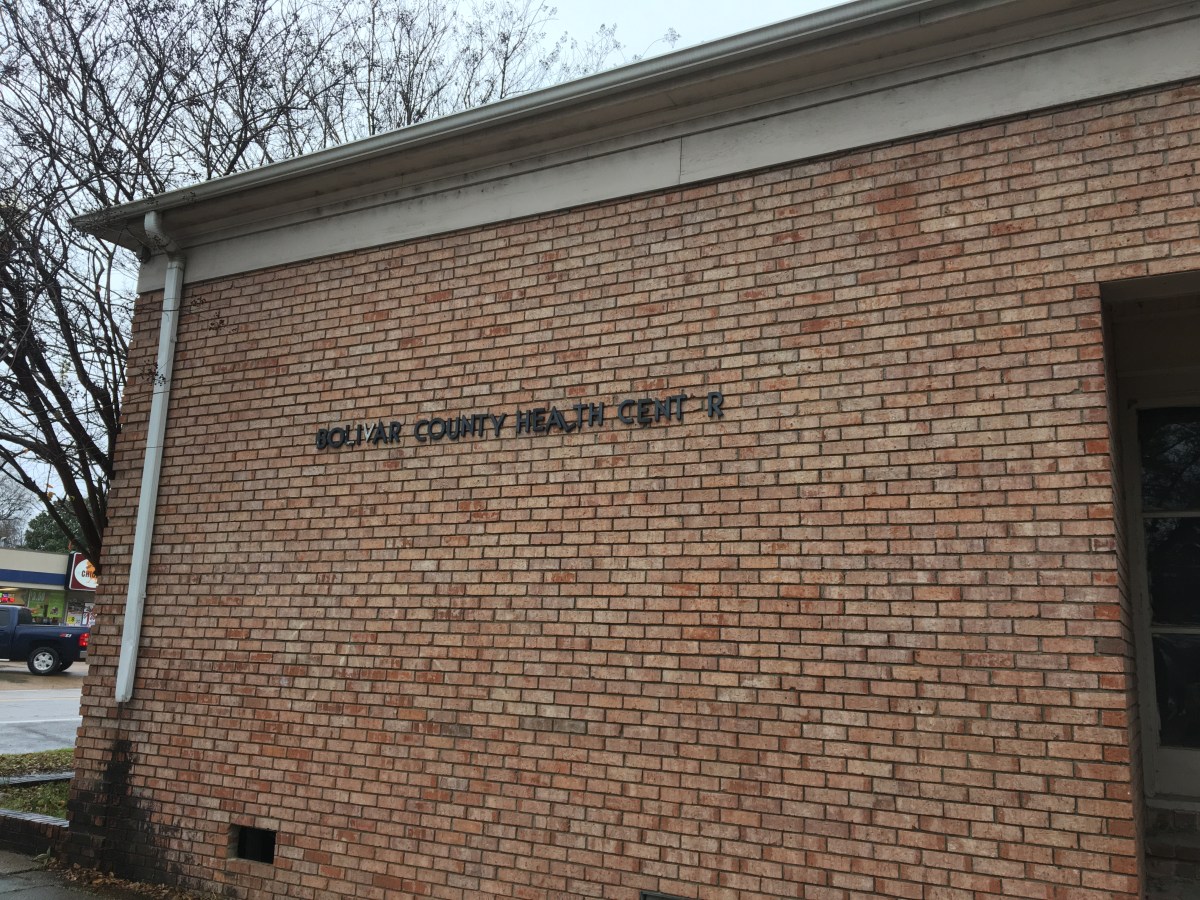
The combination of poverty, lack of insurance, serious health needs and a small, spread-out population makes health care in the Delta a puzzle that is only becoming more complicated.
Yet Thomas has found a way to make it work, by winning federal and state grants that allow her to offer services on a sliding scale, so that patients without insurance can still afford to see her. Healthy Living Family Medical Center was designated a Rural Health Clinic by the health department, which means the federal government reimburses the clinic for primary care services. Thomas also offers family planning services through the Title X grant, participates in a tobacco cessation program through the Institute of Minority Health, and offers free COVID-19 testing and vaccines.
Her husband, Jervis McGee, sees how hard she works, taking calls from patients after hours and reading up on health issues in her free time.
“A lot of people forget that she’s a normal person, too,” he said.
For Thomas, it feels critical to offer as many services as possible to a community that needs them. But it’s also exhausting to participate in so many programs, each with its own paperwork requirements, and to try to develop expertise in so many areas.
She noticed that many of her patients struggle with anxiety and depression, though they don’t always use those labels for their symptoms. She tries to refer them to psychiatrists, but availability is limited. Efforts to bring a psychiatric nurse practitioner to the clinic one day a month or to offer telemedicine haven’t panned out. So now she’s planning to go back to school to earn certification as a psychiatric nurse practitioner.
Nora Gough-Davis, the nurse practitioner and clinic owner who helped train Thomas, said operating an independent family practice clinic is no easy task. After a decade in business, Gough-Davis is hoping to sell the clinics and focus on her work teaching nursing at Delta State. She wants to make sure any buyer keeps them open.
“I’m tired,” she said. “I want to make sure that access doesn’t leave.”
And all around independent family practice owners in the Delta, the walls are closing in, as hospitals flounder and county health departments cut hours and offices.
One of Thomas’s patients that Thursday was a woman named Jennie Usry. Usry has had headaches and memory loss ever since a fall on the job in June, and she needs to see a neurologist. A specialist in Clarksdale didn’t take her insurance. And when she tried to make an appointment at Greenwood Leflore, she told Thomas, it was impossible.
“The hospital closing down, so they not taking new patients,” Usry said. “But you a doctor, so you call, it might be different.”
“I don’t know,” Thomas said. “I don’t know if that will… but I will try.”
(A spokesperson for Greenwood Leflore said the hospital’s neurology clinic is still open and accepting new patients. During negotiations with the University of Mississippi Medical Center, the clinic did not make new appointments because it was unclear whether any deal with UMMC would allow neurology services to continue. Negotiations have ended with no deal and Greenwood Leflore hopes the legislature will approve funding that will allow it to stay open.)
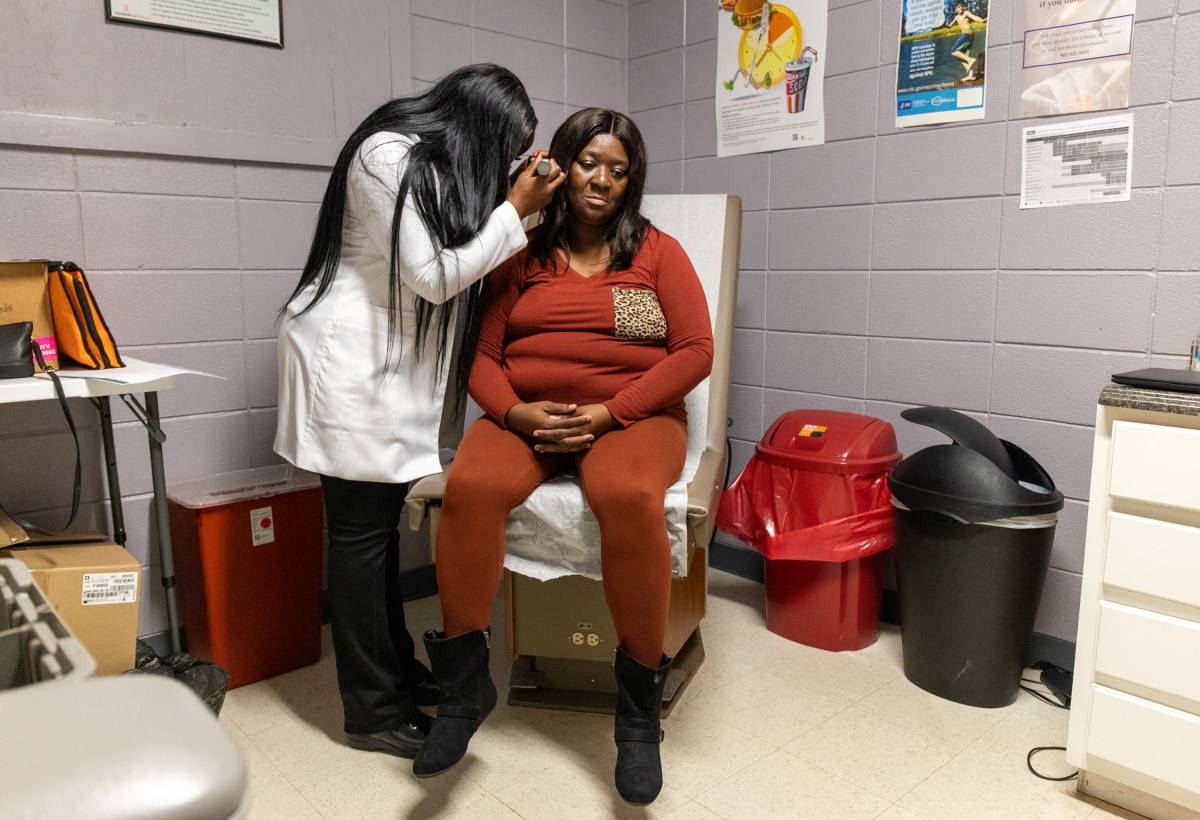
This article first appeared on Mississippi Today and is republished here under a Creative Commons license.
Mississippi Today
Mississippi prepares for another execution
The Mississippi Supreme Court has set the execution of a man who kidnapped and murdered a 20-year-old community college student in north Mississippi 30 years ago.
Charles Ray Crawford, 59, is set to be executed Oct. 15 at the Mississippi State Penitentiary at Parchman, after multiple requests by the attorney general’s office.
Eight justices joined the majority opinion to set the execution, concluding that Crawford has exhausted all state and federal legal remedies. Mississippi Supreme Court Justice T. Kenneth Griffis Jr. wrote the Friday opinion. Justice David Sullivan did not participate.
However, Kristy Noble with the Mississippi Office of Capital Post-Conviction Counsel released a statement saying it will file another appeal with the U.S. Supreme Court.
“”Mr. Crawford’s inexperienced trial counsel conceded his guilt to the jury — against Mr.
Crawford’s timely and repeated objections,” Noble said in the statement. “Mr. Crawford told his counsel to pursue a not guilty verdict. Counsel did just the opposite, which is precisely what the U.S. Supreme Court says counsel cannot do,” Noble said in the statement.
“A trial like Mr. Crawford’s – one where counsel concedes guilt over his client’s express wishes – is essentially no trial at all.”
Last fall, Crawford’s attorneys asked the court not to set an execution date because he hadn’t exhausted appeal efforts in federal court to challenge a rape conviction that is not tied to his death sentence. In June, the U.S. Supreme Court declined to take up Crawford’s case.
A similar delay occurred a decade ago, when the AG’s office asked the court to reset Crawford’s execution date, but that was denied because efforts to appeal his unrelated rape conviction were still pending.
After each unsuccessful filing, the attorney general’s office asked the Mississippi Supreme Court to set Crawford’s execution date.
On Friday, the court also denied Crawford’s third petition for post-conviction relief and a request for oral argument. It accepted the state’s motion to dismiss the petition. Seven justices concurred and Justice Leslie King concurred in result only. Again, Justice Sullivan did not participate.
Crawford was convicted and sentenced to death in Lafayette County for the 1993 rape and murder of North Mississippi Community College student Kristy Ray.
Days before he was set to go to trial on separate aggravated assault and rape charges, he kidnapped Ray from her parents’ Tippah County home, leaving ransom notes. Crawford took Ray to an abandoned barn where he stabbed her, and his DNA was found on her, indicating he sexually assaulted her, according to court records.
Crawford told police he had blackouts and only remembered parts of the crime, but not killing Ray. Later he admitted “he must of killed her” and led police to Ray’s body, according to court records.
At his 1994 trial he presented an insanity defense, including that he suffered from psychogenic amnesia – periods of time lapse without memory. Medical experts who provided rebuttal testimony said Crawford didn’t have psychogenic amnesia and didn’t show evidence of bipolar illness.
The last person executed in Mississippi was Richard Jordan in June, previously the state’s oldest and longest serving person on death row.
There are 36 people on death row, according to records from the Mississippi Department of Corrections.
Update 9/15/25: This story has been updated to include a response from the Mississippi Office of Capital Post-Conviction Counsel
This article first appeared on Mississippi Today and is republished here under a Creative Commons Attribution-NoDerivatives 4.0 International License.
The post Mississippi prepares for another execution appeared first on mississippitoday.org
Note: The following A.I. based commentary is not part of the original article, reproduced above, but is offered in the hopes that it will promote greater media literacy and critical thinking, by making any potential bias more visible to the reader –Staff Editor.
Political Bias Rating: Centrist
The article presents a factual and balanced account of the legal proceedings surrounding a scheduled execution in Mississippi. It includes perspectives from both the state’s attorney general’s office and the defense counsel, without using emotionally charged language or advocating for a particular political stance. The focus on legal details and court decisions reflects a neutral, informative approach typical of centrist reporting.
Mississippi Today
Presidents are taking longer to declare major natural disasters. For some, the wait is agonizing
TYLERTOWN — As an ominous storm approached Buddy Anthony’s one-story brick home, he took shelter in his new Ford F-250 pickup parked under a nearby carport.
Seconds later, a tornado tore apart Anthony’s home and damaged the truck while lifting it partly in the air. Anthony emerged unhurt. But he had to replace his vehicle with a used truck that became his home while waiting for President Donald Trump to issue a major disaster declaration so that federal money would be freed for individuals reeling from loss. That took weeks.
“You wake up in the truck and look out the windshield and see nothing. That’s hard. That’s hard to swallow,” Anthony said.
Disaster survivors are having to wait longer to get aid from the federal government, according to a new Associated Press analysis of decades of data. On average, it took less than two weeks for a governor’s request for a presidential disaster declaration to be granted in the 1990s and early 2000s. That rose to about three weeks during the past decade under presidents from both major parties. It’s taking more than a month, on average, during Trump’s current term, the AP found.
The delays mean individuals must wait to receive federal aid for daily living expenses, temporary lodging and home repairs. Delays in disaster declarations also can hamper recovery efforts by local officials uncertain whether they will receive federal reimbursement for cleaning up debris and rebuilding infrastructure. The AP collaborated with Mississippi Today and Mississippi Free Press on the effects of these delays for this report.
“The message that I get in the delay, particularly for the individual assistance, is that the federal government has turned its back on its own people,” said Bob Griffin, dean of the College of Emergency Preparedness, Homeland Security and Cybersecurity at the University at Albany in New York. “It’s a fundamental shift in the position of this country.”
The wait for disaster aid has grown as Trump remakes government
The Federal Emergency Management Agency often consults immediately with communities to coordinate their initial disaster response. But direct payments to individuals, nonprofits and local governments must wait for a major disaster declaration from the president, who first must receive a request from a state, territory or tribe. Major disaster declarations are intended only for the most damaging events that are beyond the resources of states and local governments.
Trump has approved more than two dozen major disaster declarations since taking office in January, with an average wait of almost 34 days after a request. That ranged from a one-day turnaround after July’s deadly flash flooding in Texas to a 67-day wait after a request for aid because of a Michigan ice storm. The average wait is up from a 24-day delay during his first term and is nearly four times as long as the average for former Republican President George H.W. Bush, whose term from 1989-1993 coincided with the implementation of a new federal law setting parameters for disaster determinations.
The delays have grown over time, regardless of the party in power. Former Democratic President Joe Biden, in his last year in office, averaged 26 days to declare major disasters — longer than any year under former Democratic President Barack Obama.

FEMA did not respond to the AP’s questions about what factors are contributing to the trend.
Others familiar with FEMA noted that its process for assessing and documenting natural disasters has become more complex over time. Disasters have also become more frequent and intense because of climate change, which is mostly caused by the burning of fuels such as gas, coal and oil.
The wait for disaster declarations has spiked as Trump’s administration undertakes an ambitious makeover of the federal government that has shed thousands of workers and reexamined the role of FEMA. A recently published letter from current and former FEMA employees warned the cuts could become debilitating if faced with a large-enough disaster. The letter also lamented that the Trump administration has stopped maintaining or removed long-term planning tools focused on extreme weather and disasters.
Shortly after taking office, Trump floated the idea of “getting rid” of FEMA, asserting: “It’s very bureaucratic, and it’s very slow.”
FEMA’s acting chief suggested more recently that states should shoulder more responsibility for disaster recovery, though FEMA thus far has continued to cover three-fourths of the costs of public assistance to local governments, as required under federal law. FEMA pays the full cost of its individual assistance.
Former FEMA Administrator Pete Gaynor, who served during Trump’s first term, said the delay in issuing major disaster declarations likely is related to a renewed focus on making sure the federal government isn’t paying for things state and local governments could handle.
“I think they’re probably giving those requests more scrutiny,” Gaynor said. “And I think it’s probably the right thing to do, because I think the (disaster) declaration process has become the ‘easy button’ for states.”
The Associated Press on Monday received a statement from White House spokeswoman Abigail Jackson in response to a question about why it is taking longer to issue major natural disaster declarations:
“President Trump provides a more thorough review of disaster declaration requests than any Administration has before him. Gone are the days of rubber stamping FEMA recommendations – that’s not a bug, that’s a feature. Under prior Administrations, FEMA’s outsized role created a bloated bureaucracy that disincentivized state investment in their own resilience. President Trump is committed to right-sizing the Federal government while empowering state and local governments by enabling them to better understand, plan for, and ultimately address the needs of their citizens. The Trump Administration has expeditiously provided assistance to disasters while ensuring taxpayer dollars are spent wisely to supplement state actions, not replace them.”

In Mississippi, frustration festered during wait for aid
The tornado that struck Anthony’s home in rural Tylertown on March 15 packed winds up to 140 mph. It was part of a powerful system that wrecked homes, businesses and lives across multiple states.
Mississippi’s governor requested a federal disaster declaration on April 1. Trump granted that request 50 days later, on May 21, while approving aid for both individuals and public entities.
On that same day, Trump also approved eight other major disaster declarations for storms, floods or fires in seven other states. In most cases, more than a month had passed since the request and about two months since the date of those disasters.
If a presidential declaration and federal money had come sooner, Anthony said he wouldn’t have needed to spend weeks sleeping in a truck before he could afford to rent the trailer where he is now living. His house was uninsured, Anthony said, and FEMA eventually gave him $30,000.
In nearby Jayess in Lawrence County, Dana Grimes had insurance but not enough to cover the full value of her damaged home. After the eventual federal declaration, Grimes said FEMA provided about $750 for emergency expenses, but she is now waiting for the agency to determine whether she can receive more.

“We couldn’t figure out why the president took so long to help people in this country,” Grimes said. “I just want to tie up strings and move on. But FEMA — I’m still fooling with FEMA.”
Jonathan Young said he gave up on applying for FEMA aid after the Tylertown tornado killed his 7-year-old son and destroyed their home. The process seemed too difficult, and federal officials wanted paperwork he didn’t have, Young said. He made ends meet by working for those cleaning up from the storm.
“It’s a therapy for me,” Young said, “to pick up the debris that took my son away from me.”
Historically, presidential disaster declarations containing individual assistance have been approved more quickly than those providing assistance only to public entities, according to the AP’s analysis. That remains the case under Trump, though declarations for both types are taking longer.
About half the major disaster declarations approved by Trump this year have included individual assistance.
Some people whose homes are damaged turn to shelters hosted by churches or local nonprofit organizations in the initial chaotic days after a disaster. Others stay with friends or family or go to a hotel, if they can afford it.
But some insist on staying in damaged homes, even if they are unsafe, said Chris Smith, who administered FEMA’s individual assistance division under three presidents from 2015-2022. If homes aren’t repaired properly, mold can grow, compounding the recovery challenges.

That’s why it’s critical for FEMA’s individual assistance to get approved quickly — ideally, within two weeks of a disaster, said Smith, who’s now a disaster consultant for governments and companies.
“You want to keep the people where they are living. You want to ensure those communities are going to continue to be viable and recover,” Smith said. “And the earlier that individual assistance can be delivered … the earlier recovery can start.”
In the periods waiting for declarations, the pressure falls on local officials and volunteers to care for victims and distribute supplies.
In Walthall County, where Tylertown is, insurance agent Les Lampton remembered watching the weather news as the first tornado missed his house by just an eighth of a mile. Lampton, who moonlights as a volunteer firefighter, navigated the collapsed trees in his yard and jumped into action. About 45 minutes later, the second tornado hit just a mile away.
“It was just chaos from there on out,” Lampton said.
Walthall County, with a population of about 14,000, hasn’t had a working tornado siren in about 30 years, Lampton said. He added there isn’t a public safe room in the area, although a lot of residents have ones in their home.
Rural areas with limited resources are hit hard by delays in receiving funds through FEMA’s public assistance program, which, unlike individual assistance, only reimburses local entities after their bills are paid. Long waits can stoke uncertainty and lead cost-conscious local officials to pause or scale-back their recovery efforts.

In Walthall County, officials initially spent about $700,000 cleaning up debris, then suspended the cleanup for more than a month because they couldn’t afford to spend more without assurance they would receive federal reimbursement, said county emergency manager Royce McKee. Meanwhile, rubble from splintered trees and shattered homes remained piled along the roadside, creating unsafe obstacles for motorists and habitat for snakes and rodents.
When it received the federal declaration, Walthall County took out a multimillion-dollar loan to pay contractors to resume the cleanup.
“We’re going to pay interest and pay that money back until FEMA pays us,” said Byran Martin, an elected county supervisor. “We’re hopeful that we’ll get some money by the first of the year, but people are telling us that it could be [longer].”
Lampton, who took after his father when he joined the volunteer firefighters 40 years ago, lauded the support of outside groups such as Cajun Navy, Eight Days of Hope, Samaritan’s Purse and others. That’s not to mention the neighbors who brought their own skid steers and power saws to help clear trees and other debris, he added.
“That’s the only thing that got us through this storm, neighbors helping neighbors,” Lampton said. “If we waited on the government, we were going to be in bad shape.”
Lieb reported from Jefferson City, Missouri, and Wildeman from Hartford, Connecticut.
Update 98/25: This story has been updated to include a White House statement released after publication.
This article first appeared on Mississippi Today and is republished here under a Creative Commons Attribution-NoDerivatives 4.0 International License.
The post Presidents are taking longer to declare major natural disasters. For some, the wait is agonizing appeared first on mississippitoday.org
Note: The following A.I. based commentary is not part of the original article, reproduced above, but is offered in the hopes that it will promote greater media literacy and critical thinking, by making any potential bias more visible to the reader –Staff Editor.
Political Bias Rating: Center-Left
This article presents a critical view of the Trump administration’s handling of disaster declarations, highlighting delays and their negative impacts on affected individuals and communities. It emphasizes concerns about government downsizing and reduced federal support, themes often associated with center-left perspectives that favor robust government intervention and social safety nets. However, it also includes statements from Trump administration officials defending their approach, providing some balance. Overall, the tone and framing lean slightly left of center without being overtly partisan.
Mississippi Today
Northeast Mississippi speaker and worm farmer played key role in Coast recovery after Hurricane Katrina
The 20th anniversary of Hurricane Katrina slamming the Mississippi Gulf Coast has come and gone, rightfully garnering considerable media attention.
But still undercovered in the 20th anniversary saga of the storm that made landfall on Aug. 29, 2005, and caused unprecedented destruction is the role that a worm farmer from northeast Mississippi played in helping to revitalize the Coast.
House Speaker Billy McCoy, who died in 2019, was a worm farmer from the Prentiss, not Alcorn County, side of Rienzi — about as far away from the Gulf Coast as one could be in Mississippi.
McCoy grew other crops, but a staple of his operations was worm farming.
Early after the storm, the House speaker made a point of touring the Coast and visiting as many of the House members who lived on the Coast as he could to check on them.
But it was his action in the forum he loved the most — the Mississippi House — that is credited with being key to the Coast’s recovery.
Gov. Haley Barbour had called a special session about a month after the storm to take up multiple issues related to Katrina and the Gulf Coast’s survival and revitalization. The issue that received the most attention was Barbour’s proposal to remove the requirement that the casinos on the Coast be floating in the Mississippi Sound.
Katrina wreaked havoc on the floating casinos, and many operators said they would not rebuild if their casinos had to be in the Gulf waters. That was a crucial issue since the casinos were a major economic engine on the Coast, employing an estimated 30,000 in direct and indirect jobs.
It is difficult to fathom now the controversy surrounding Barbour’s proposal to allow the casinos to locate on land next to the water. Mississippi’s casino industry that was birthed with the early 1990s legislation was still new and controversial.
Various religious groups and others had continued to fight and oppose the casino industry and had made opposition to the expansion of gambling a priority.
Opposition to casinos and expansion of casinos was believed to be especially strong in rural areas, like those found in McCoy’s beloved northeast Mississippi. It was many of those rural areas that were the homes to rural white Democrats — now all but extinct in the Legislature but at the time still a force in the House.
So, voting in favor of casino expansion had the potential of being costly for what was McCoy’s base of power: the rural white Democrats.
Couple that with the fact that the Democratic-controlled House had been at odds with the Republican Barbour on multiple issues ranging from education funding to health care since Barbour was inaugurated in January 2004.
Barbour set records for the number of special sessions called by the governor. Those special sessions often were called to try to force the Democratic-controlled House to pass legislation it killed during the regular session.
The September 2005 special session was Barbour’s fifth of the year. For context, current Gov. Tate Reeves has called four in his nearly six years as governor.
There was little reason to expect McCoy to do Barbour’s bidding and lead the effort in the Legislature to pass his most controversial proposal: expanding casino gambling.
But when Barbour ally Lt. Gov. Amy Tuck, who presided over the Senate, refused to take up the controversial bill, Barbour was forced to turn to McCoy.
The former governor wrote about the circumstances in an essay he penned on the 20th anniversary of Hurricane Katrina for Mississippi Today Ideas.
“The Senate leadership, all Republicans, did not want to go first in passing the onshore casino law,” Barbour wrote. “So, I had to ask Speaker McCoy to allow it to come to the House floor and pass. He realized he should put the Coast and the state’s interests first. He did so, and the bill passed 61-53, with McCoy voting no.
“I will always admire Speaker McCoy, often my nemesis, for his integrity in putting the state first.”
Incidentally, former Rep. Bill Miles of Fulton, also in northeast Mississippi, was tasked by McCoy with counting, not whipping votes, to see if there was enough support in the House to pass the proposal. Not soon before the key vote, Miles said years later, he went to McCoy and told him there were more than enough votes to pass the legislation so he was voting no and broached the idea of the speaker also voting no.
It is likely that McCoy would have voted for the bill if his vote was needed.
Despite his no vote, the Biloxi Sun Herald newspaper ran a large photo of McCoy and hailed the Rienzi worm farmer as a hero for the Mississippi Gulf Coast.
This article first appeared on Mississippi Today and is republished here under a Creative Commons Attribution-NoDerivatives 4.0 International License.
The post Northeast Mississippi speaker and worm farmer played key role in Coast recovery after Hurricane Katrina appeared first on mississippitoday.org
Note: The following A.I. based commentary is not part of the original article, reproduced above, but is offered in the hopes that it will promote greater media literacy and critical thinking, by making any potential bias more visible to the reader –Staff Editor.
Political Bias Rating: Centrist
The article presents a factual and balanced account of the political dynamics surrounding Hurricane Katrina recovery efforts in Mississippi, focusing on bipartisan cooperation between Democratic and Republican leaders. It highlights the complexities of legislative decisions without overtly favoring one party or ideology, reflecting a neutral and informative tone typical of centrist reporting.
-
News from the South - North Carolina News Feed5 days ago
What we know about Charlie Kirk shooting suspect, how he was caught
-
Local News Video7 days ago
Introducing our WXXV Student Athlete of the Week, St. Patrick’s Parker Talley!
-
Local News6 days ago
Russian drone incursion in Poland prompts NATO leaders to take stock of bigger threats
-
News from the South - North Carolina News Feed6 days ago
Federal hate crime charge sought in Charlotte stabbing | North Carolina
-
The Center Square7 days ago
Weapon recovered as manhunt continues in Kirk assassination investigation | National
-
Our Mississippi Home4 days ago
Screech Owls – Small but Cute
-
News from the South - Arkansas News Feed5 days ago
NW Arkansas Championship expected to bring money to Rogers
-
News from the South - Tennessee News Feed7 days ago
Middle Tennessee State University dean filed over Kirk comments | Tennessee
